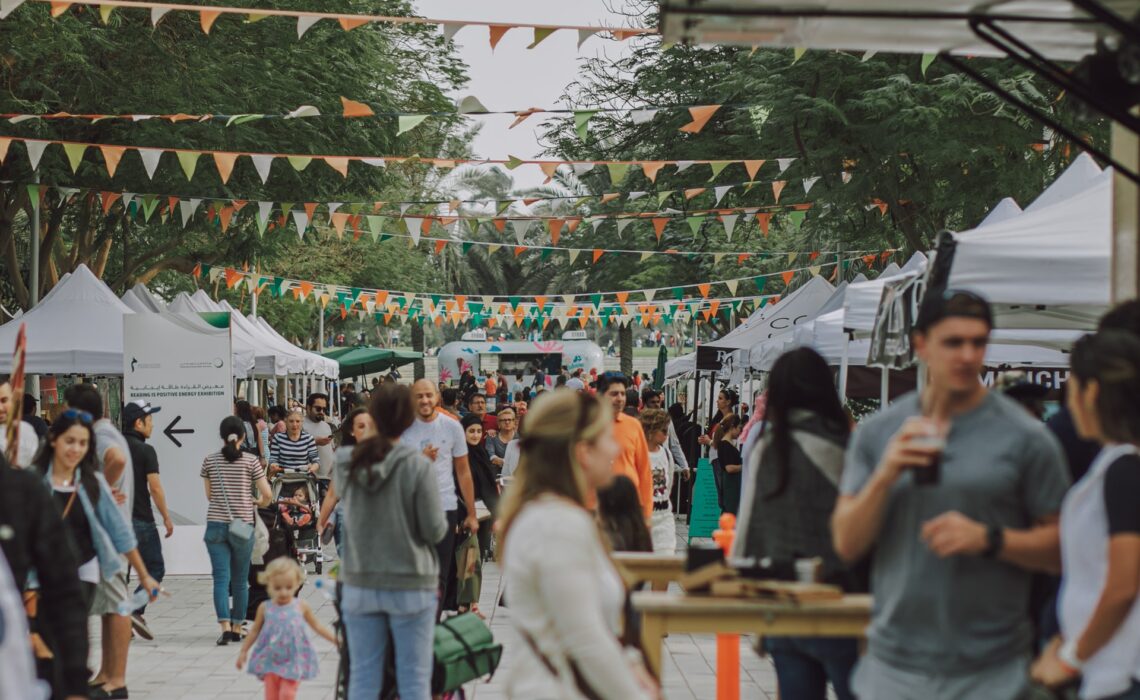
There are a lot of benefits to planning an outdoor event. For starters, you can get a little messy with activities like water balloon fights or sports competitions. While you can technically do those things inside, you won’t have to worry about getting furniture wet or a stray ball breaking a window. On top of that, outdoor events usually have larger venues. This means more space to spread out, play games, and really make your event feel like an experience. But planning an outdoor event comes with it’s challenges, too.
Every event takes a lot of work to plan. But if you’re used to planning indoor events, there are some important components that you might not be used to. In this post, we’ll cover 10 of those components so your next outdoor event can be as safe and functional as it is fun. Some of these details will vary based on city, so be sure to research the specific rules ahead of time, so you can factor in any added steps. Then, get to planning!
1. Have a back-up plan
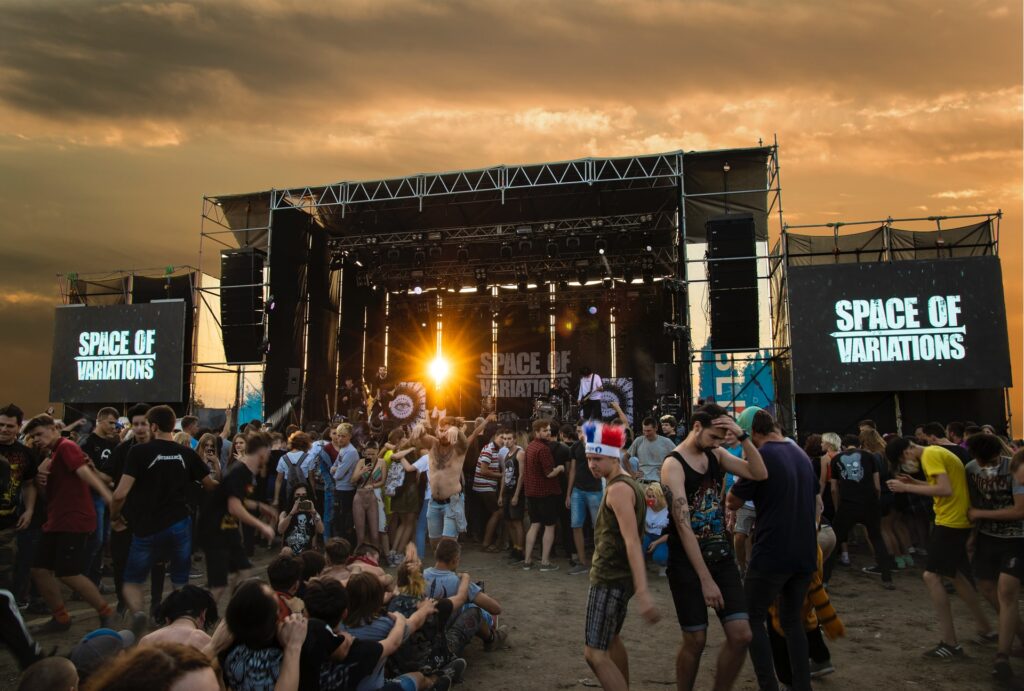
When planning an outdoor event, you’re always keeping one eye on the weather. But you can’t always rely on the weather forecast, especially in areas that experience inconsistent weather throughout the year. (Like our home state, Maine.) So if you’re planning an outdoor event, make sure you have back-up plan in case it rains, or it’s too hot or cold.
This can include a second, indoor location where you can comfortably fit everyone. And if you’re using a private venue, they may offer both indoor and outdoor space for times such as these. But your solution can also be something simple, like a large outdoor tent. The specific back-up plan will depend on your activities, guest list, and event needs—but you should always have one!
2. Acquire the right permits
If you’re planning an outdoor event at a private venue, you probably don’t have to worry about permits. (But you should check with your venue, just to be sure!) For events in public spaces, like parks and beaches, however, you may have to acquire permits.
Bonus Tip: Not having the proper permits can result in an immediate shut down of your event.
Permits essentially give you permission to do what you’re doing, where you’re doing it. For example, a fire permit will allow you to have a bonfire, and a alcohol permit will allow you to serve alcohol. Each city or town will have its own permits, so check on your local government’s website or give them a call.
3. Don’t forget about ordinances and codes
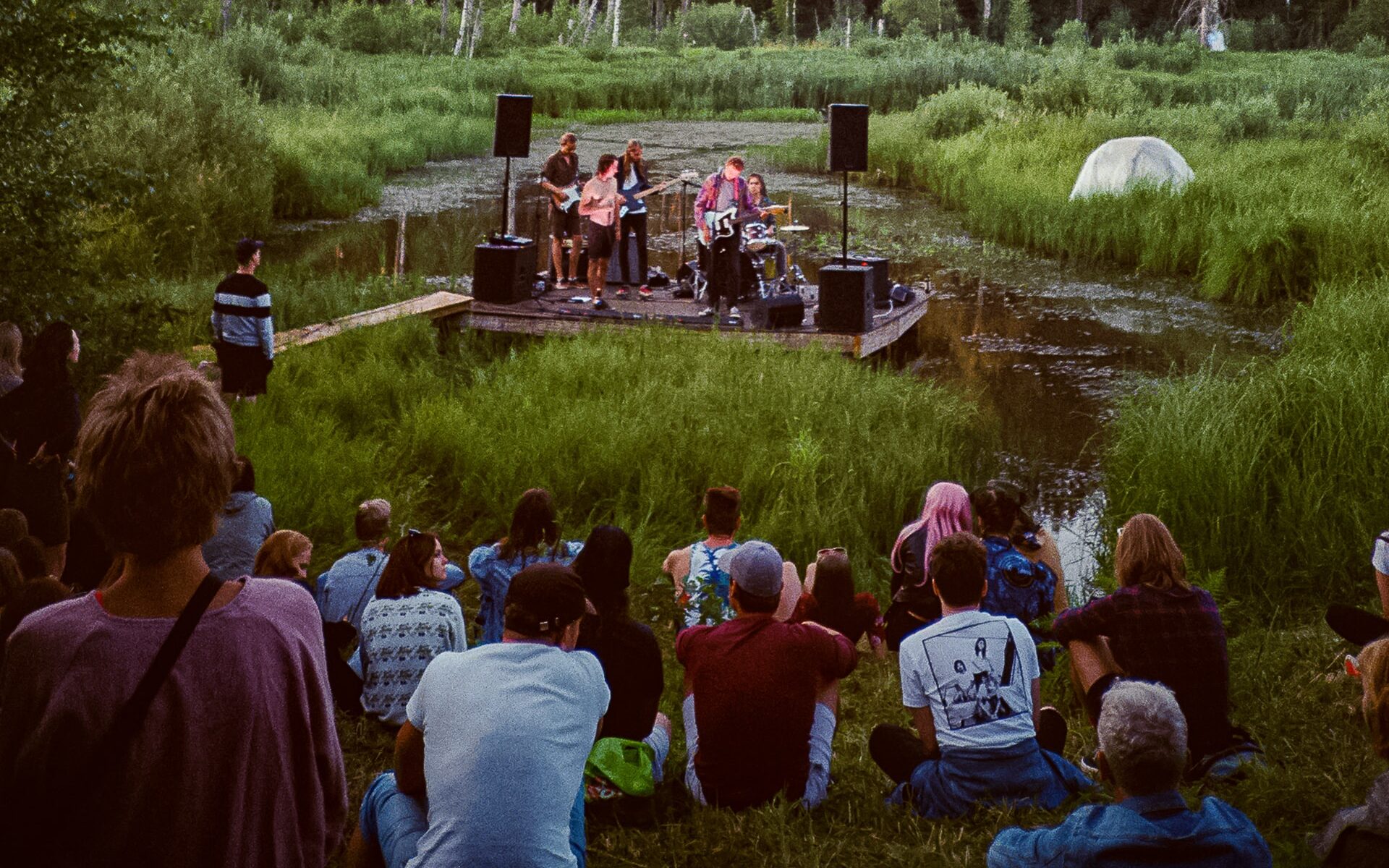
Ordinances and codes are different from permits, but they’re equally as important. Ordinances and codes are the rules your event must follow, even with proper permits. For example, you may have a fire permit for your bonfire, but you might only be able to light the fire during certain hours. Similarly, you there may be a noise ordinance in your city. This usually means your event can’t be too loud or it can’t be loud after a certain time, like 9 p.m.
Codes are similar. Your city might have a fire and safety codes, which include rules about fire protection and the ability for emergency vehicles to access the grounds. Just like permits, each city will be a little different, so you’ll want to do research ahead of time. And also just like permits, breaking ordinances and codes can result in an immediate shut down of your event.
4. Coordinate necessary lighting and equipment
When you plan an indoor event, the venue likely comes with lights and proper AV support. The same is usually true at a private outdoor venue, too. But events at public outdoor spaces don’t usually come with any of that. So if you need special equipment—like speakers—you’ll have to provide them. And if you’re event goes into the evening, you won’t be able to rely on the sun. Be sure to have lights ready to go!
5. Keep the food and drinks safe
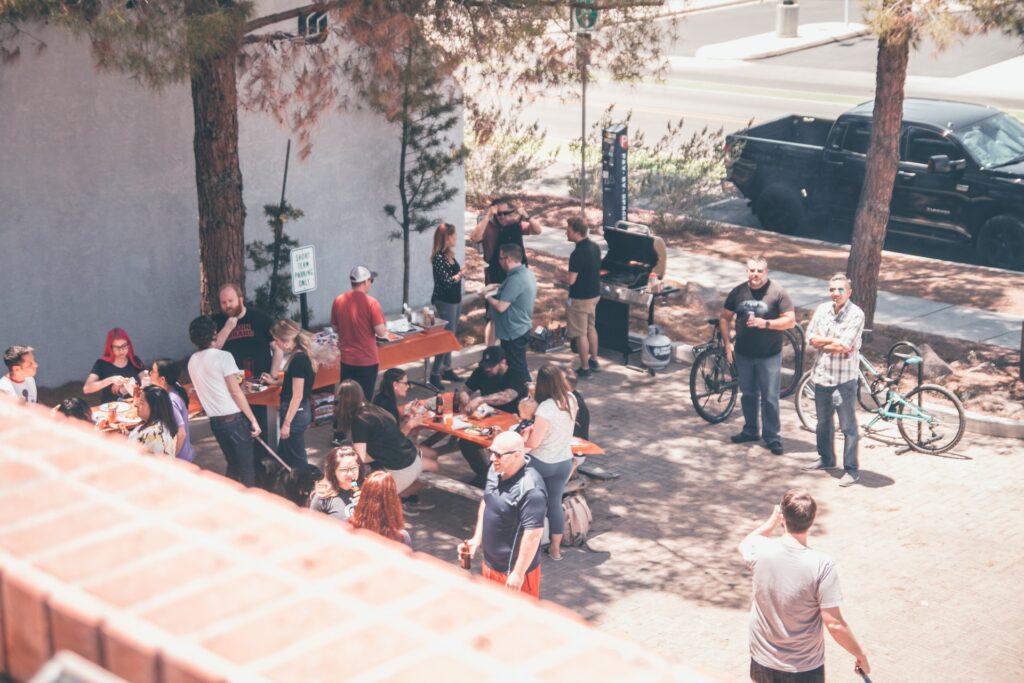
Outdoor events can be troublesome for food and beverages. For example, certain foods need to stay cool or warm to be safe for consumption. Plus, direct sunlight and bugs can spoil the spread. So make sure you have plenty of coolers and ice to keep food at the proper temperature.
You can also store warm food in insulated containers or chafing dishes—the technical term for dishes that sit above a flame to keep food warm. But chafing dishes have an open flame, so you’ll need to check the permits and safety codes around that before committing to them. Thankfully, drinks are easier. You can keep canned or bottled beverages safe in coolers filled with ice—no permits necessary!
6. Make your guests comfortable
You’re outside, which means bathrooms might not come with the space. It also means you’re exposed to the weather. Neither of these are bad things—they’re part of being outside! But you should take extra care to make sure your guests are comfortable. This includes providing shaded areas at the event and ample bathroom access with services like porta potties. Once again, remember to check the codes—specifically the health codes. Your city may have rules about the ratio of bathrooms to guests.
7. Consider the environment
When you’re inside, it’s easy to mop up spills or sweep away debris. But outside, it’s much harder. While it’s imperative to provide enough trash containers to hold the event waste, it’s also important to consider what that waste includes.
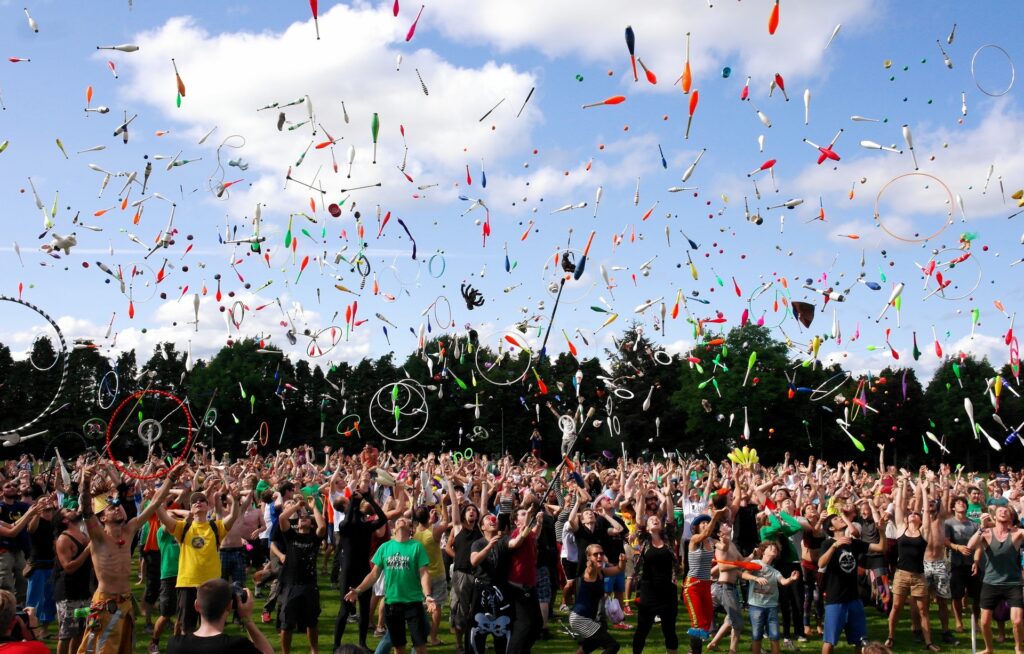
For example, if you plan on having some sort of confetti, choose biodegradable, earth-friendly confetti. Or if you’re going to have fireworks, be sure to clean up every piece of debris. The outdoors are a great place to celebrate—but we still have to do our part to keep them clean for the next event.
8. Control the pests
Evening events are susceptible to mosquitos, and food attracts all sorts of bugs. This is especially true for events near water. Depending on the location, you may be able to have a pest control technician treat the area before the event. Of course, you’ll want to check with your city if this is a public area.
For pests like mosquitoes, you can also use different forms of bug repellent throughout the event as an added layer of protection. Just keep it far enough away from the food! And we encourage you to be careful not to upset the ecosystem of the area. Your technician should be able to find the best option for you and your space.
9. Have first aid on hand
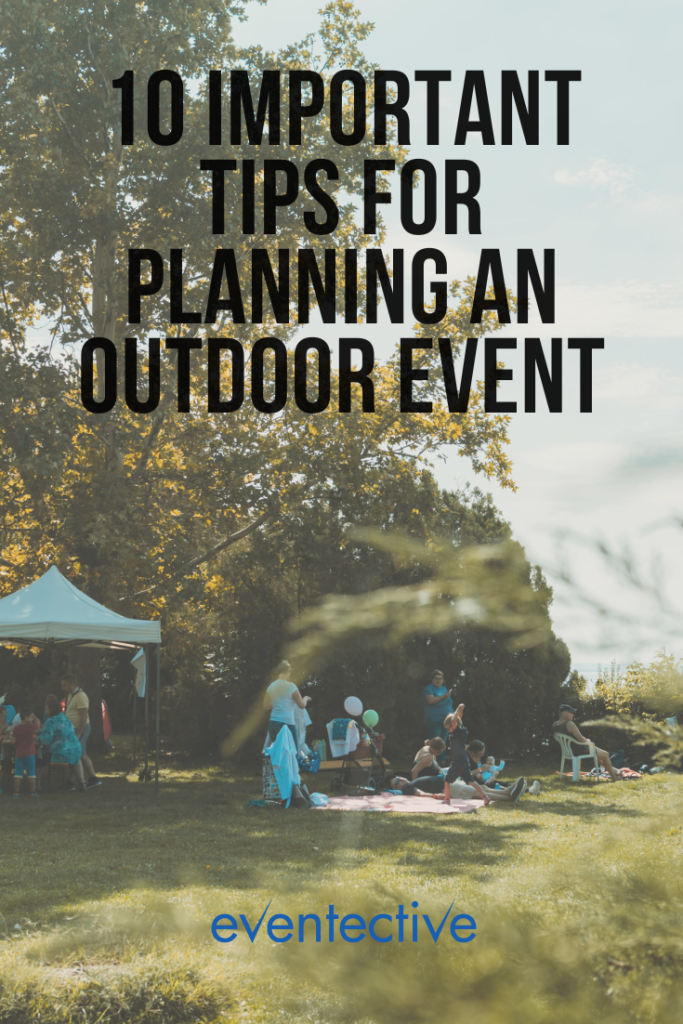
For all the reasons we’ve discussed—exposure to weather and pests, proximity to water, and fire pits—it’s important to have first aid available for the duration of your event. The type of first aid will depend on the nature of your event, the location, and your guests. In some cases, first aid kits may be enough. But for larger events that are activity based, you may want a first aid tent with medical professionals on stand by.
10. Prepare for clean up
We already mentioned that clean up should be part of your initial planning. But in many cases, clean up will be solely your responsibility. Private venues may offer clean-up services as an add-on amenity if you need it. But public spaces won’t. Instead, it’ll be your responsibility to properly clear away all garbage and signs of an event. Some cities may even fine you if you don’t clean up properly, so be thorough!
Conclusion
Outdoor events can allow for a whole different type of event. You can host bonfires, water balloon fights, and even safely distance from other guests if you need to. But it also comes with additional considerations, too, like first aid, pest control, and local regulations. If this is your first time planning an outdoor event, be sure to research your city’s guidelines and give yourself extra time to plan so you can do it right!
What are your favorite outdoor activities? Do you attend public events with them in mind?

